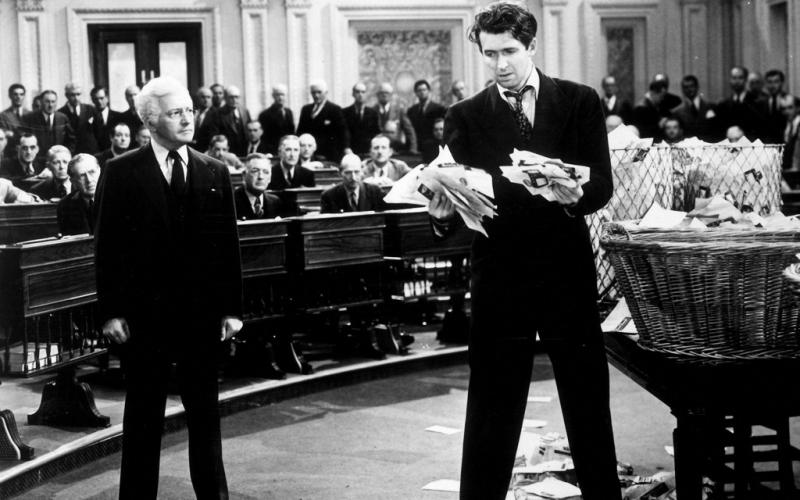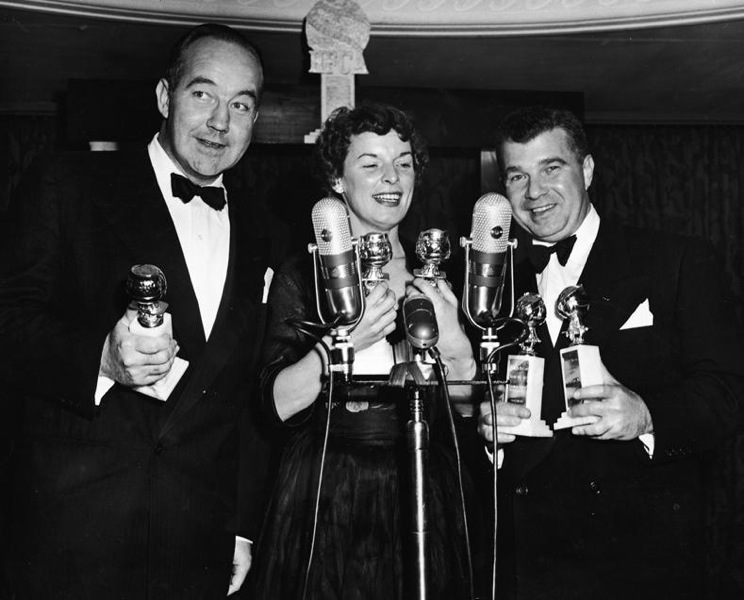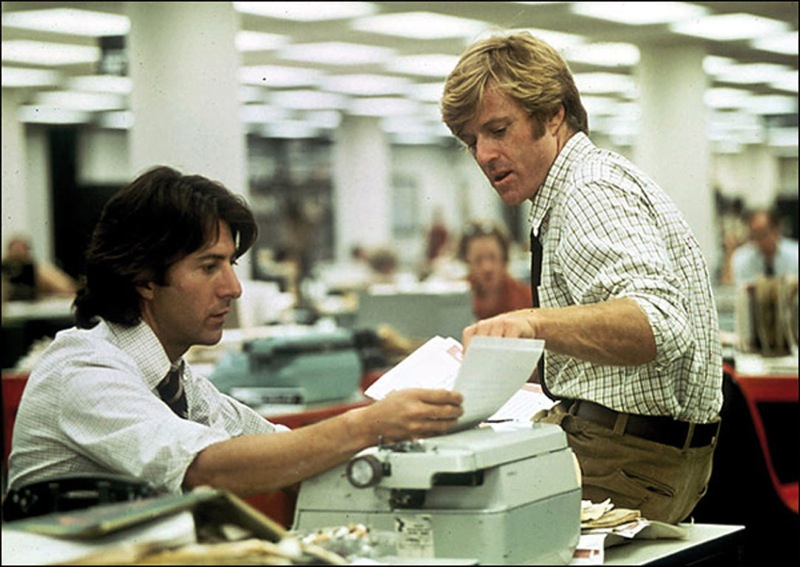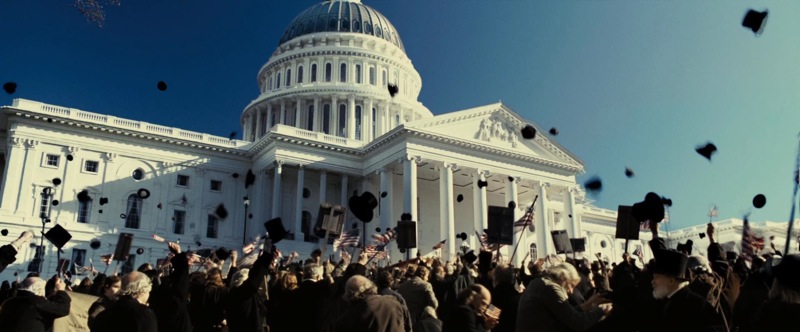Oscars 2013: Casting a vote for political films | reviews, news & interviews
Oscars 2013: Casting a vote for political films
Oscars 2013: Casting a vote for political films
An Oscar nomination for a political film is like a spoilt ballot paper - redundant. Can 2013 buck the trend?

An intriguing aspect of this year’s battle for Oscar was the early assurance with which pundits placed Lincoln as their favourite for best film. Steven Spielberg's frontrunner merits recognition; what surprises is that no one has noted the significance if it were actually to win. For despite Hollywood’s long history of fine political films, in over 80 years only one has ever won the prize.
That exception was All The King’s Men, in 1950. Based on a Pulitzer Prize-winning novel, Robert Rossen’s drama chronicled the rise and fall of Willie Stark, a once idealistic Southern lawyer turned megalomaniacal governor. The film also earned Oscars for Broderick Crawford, who played Stark, and supporting actress Mercedes McCambridge (pictured below with Rossen). It’s a powerful account of the corrupting effects of power, with enough melodrama to add a popcorn element for audiences – in other words, pure Hollywood.
 But before and since, the Academy has balked at giving the ultimate honour to political films, often recognising the writing and performances, stretching as far as a best film nomination, but ultimately not finding the subject of politics sufficiently to its taste.
But before and since, the Academy has balked at giving the ultimate honour to political films, often recognising the writing and performances, stretching as far as a best film nomination, but ultimately not finding the subject of politics sufficiently to its taste.
Thus in 1964 The Best Man, a scathing look at the shenanigans of a presidential campaign – penned by that most deliciously cynical of American political commentators, Gore Vidal, and starring Henry Fonda – gained a sole nomination, for best supporting actor; this in a year when nominations for best film included such soft-centred fare as Zorba the Greek, Mary Poppins and the winner, My Fair Lady.
In 1973 Michael Ritchie’s terrific The Candidate, starring Robert Redford as a California liberal gradually selling out his ideals in his fight for the Senate, won best original screenplay, yet didn’t get nominated for best film. In 1977, Alan J Pakula’s mesmerising retelling of the Washington Post investigation of Watergate, All The President’s Men, again with Redford (pictured below with Dustin Hoffman), also picked up a screenplay gong – indeed, William Goldberg’s script is one of the most celebrated pieces of writing in cinema – yet this great film lost out to Sylvester Stallone’s pappy paean to pugilistic doggedness, Rocky.
 In 1982, Warren Beatty was named best director for his epic account of American communism, Reds, but the film itself lost to Chariots of Fire – a structurally ambitious and thought-provoking movie pipped at the finishing line by a feelgood contender boosted by the performance-enhancing drug known as Vangelis. In 1992 Oliver Stone’s JFK finished in the pack behind The Silence of the Lambs: one perspective would be that the better film won, another that Oscar voters would rather opt for a film in which women are flayed for transsexual couture, rather than a personal, and highly political movie that dared to challenge perceptions of their history.
In 1982, Warren Beatty was named best director for his epic account of American communism, Reds, but the film itself lost to Chariots of Fire – a structurally ambitious and thought-provoking movie pipped at the finishing line by a feelgood contender boosted by the performance-enhancing drug known as Vangelis. In 1992 Oliver Stone’s JFK finished in the pack behind The Silence of the Lambs: one perspective would be that the better film won, another that Oscar voters would rather opt for a film in which women are flayed for transsexual couture, rather than a personal, and highly political movie that dared to challenge perceptions of their history.
Not even comedy can smooth the way. In 1940, Frank Capra’s glorious Mr Smith Goes to Washington, which introduced the wider world to the filibuster, lost out to the overblown and overrated Gone With the Wind (admittedly this was a singular year, in which other disappointed nominees included Stagecoach, Ninotchka and The Wizard of Oz). Capra’s movie did – this is such a clear pattern – win for its writing; and a year later Preston Sturgess won the same award, for his political satire The Great McGinty, while the film itself failed to receive one of the 10 best film nominations that year.
 One of the best ever political movies – and certainly one that had a clear political agenda as well as theme – is Z (with Jean-Louis Trintignant, pictured above), Costa-Gavras’s thrilling, fictionalised account of the assassination of a leftist Greek politician and the subsequent cover-up. Z was named the best foreign language film of 1970, while also being nominated for best director and best film, though of course not winning. One might imagine that the Academy – finding the quality of Z irresistible and looking for compromises – found rare, welcome relief in the subtitled category.
One of the best ever political movies – and certainly one that had a clear political agenda as well as theme – is Z (with Jean-Louis Trintignant, pictured above), Costa-Gavras’s thrilling, fictionalised account of the assassination of a leftist Greek politician and the subsequent cover-up. Z was named the best foreign language film of 1970, while also being nominated for best director and best film, though of course not winning. One might imagine that the Academy – finding the quality of Z irresistible and looking for compromises – found rare, welcome relief in the subtitled category.
no-one over there really likes films that rock the boat Trying to understand the constant resistance to political movies at the sharp end of the contest is as futile as trying to explain other Oscar trends – the continued failure of comedy, say, in contrast to the sometimes baffling success of musicals, or the career-long snubs to such as Hitchcock, Cary Grant and, for so many years, Scorsese. Yet there is the unavoidable suggestion that in the minds of Tinseltown alumni political themes are deemed all well and good but, ultimately, not entertaining enough (I can’t imagine they consider films in terms of their being cinematic) to deserve the statuette.
Given certain other snubs over the years – from Citizen Kane, which won just one of its nine nominations (you’ve got it: for screenplay) to Kathryn Bigelow’s omission in the best director shortlist this year – it's also clear that no one over there really likes films that rock the boat.
If perceived popularity were a factor (put another way, a condescending view that audiences are not turned on by political stories), then the politically-themed films nominated on Sunday – and there are four, actually – have a better than usual chance.
 The US box office successes of both Lincoln (pictured above) and Bigelow’s Zero Dark Thirty are indicative of a period in which Americans are much more reflective and self-critical than is their custom. Aside from its homage to the country’s most revered president, Spielberg’s film is a practical reminder of the enduring battle between American idealism and bigotry, and between its White House and Congress; Bigelow’s riveting account of the pursuit of Osama bin Laden is concerned with the moral quagmire of history so fresh that it hurts. Audiences are responding to the opportunities and questions these films have offered.
The US box office successes of both Lincoln (pictured above) and Bigelow’s Zero Dark Thirty are indicative of a period in which Americans are much more reflective and self-critical than is their custom. Aside from its homage to the country’s most revered president, Spielberg’s film is a practical reminder of the enduring battle between American idealism and bigotry, and between its White House and Congress; Bigelow’s riveting account of the pursuit of Osama bin Laden is concerned with the moral quagmire of history so fresh that it hurts. Audiences are responding to the opportunities and questions these films have offered.
Like Lincoln, Tarantino’s Django Unchained has slavery as its subject. While hardly the seminal commentary on one of America’s most shameful episodes that Tarantino claims, and more cinephile than politically-minded, it is a surprisingly bold counterpoint to Spielberg’s respectful biopic. Finally, Ben Affleck’s Argo – the film that is surging up the inside lane after a string of guild victories – is another highly entertaining example of Hollywood’s ability to combine politics and popcorn, mining as it does the comedic back story of the Iranian hostage situation of 1979.
Will any of these break the glass ceiling for the first time in 60 years, and bring the prize home to a political movie? If we were to believe a final shot from Lincoln, exits polls suggest they might.
Explore topics
Share this article
The future of Arts Journalism
You can stop theartsdesk.com closing!
We urgently need financing to survive. Our fundraising drive has thus far raised £49,000 but we need to reach £100,000 or we will be forced to close. Please contribute here: https://gofund.me/c3f6033d
And if you can forward this information to anyone who might assist, we’d be grateful.

Subscribe to theartsdesk.com
Thank you for continuing to read our work on theartsdesk.com. For unlimited access to every article in its entirety, including our archive of more than 15,000 pieces, we're asking for £5 per month or £40 per year. We feel it's a very good deal, and hope you do too.
To take a subscription now simply click here.
And if you're looking for that extra gift for a friend or family member, why not treat them to a theartsdesk.com gift subscription?
more Film
 The Perfect Neighbor, Netflix review - Florida found-footage documentary is a harrowing watch
Sundance winner chronicles a death that should have been prevented
The Perfect Neighbor, Netflix review - Florida found-footage documentary is a harrowing watch
Sundance winner chronicles a death that should have been prevented
 Blu-ray: Le Quai des Brumes
Love twinkles in the gloom of Marcel Carné’s fogbound French poetic realist classic
Blu-ray: Le Quai des Brumes
Love twinkles in the gloom of Marcel Carné’s fogbound French poetic realist classic
 Frankenstein review - the Prometheus of the charnel house
Guillermo del Toro is fitfully inspired, but often lost in long-held ambitions
Frankenstein review - the Prometheus of the charnel house
Guillermo del Toro is fitfully inspired, but often lost in long-held ambitions
 London Film Festival 2025 - a Korean masterclass in black comedy and a Camus classic effectively realised
New films from Park Chan-wook, Gianfranco Rosi, François Ozon, Ildikó Enyedi and more
London Film Festival 2025 - a Korean masterclass in black comedy and a Camus classic effectively realised
New films from Park Chan-wook, Gianfranco Rosi, François Ozon, Ildikó Enyedi and more
 After the Hunt review - muddled #MeToo provocation
Julia Roberts excels despite misfiring drama
After the Hunt review - muddled #MeToo provocation
Julia Roberts excels despite misfiring drama
 London Film Festival 2025 - Bradley Cooper channels John Bishop, the Boss goes to Nebraska, and a French pandemic
... not to mention Kristen Stewart's directing debut and a punchy prison drama
London Film Festival 2025 - Bradley Cooper channels John Bishop, the Boss goes to Nebraska, and a French pandemic
... not to mention Kristen Stewart's directing debut and a punchy prison drama
 Ballad of a Small Player review - Colin Farrell's all in as a gambler down on his luck
Conclave director Edward Berger swaps the Vatican for Asia's sin city
Ballad of a Small Player review - Colin Farrell's all in as a gambler down on his luck
Conclave director Edward Berger swaps the Vatican for Asia's sin city
 London Film Festival 2025 - from paranoia in Brazil and Iran, to light relief in New York and Tuscany
'Jay Kelly' disappoints, 'It Was Just an Accident' doesn't
London Film Festival 2025 - from paranoia in Brazil and Iran, to light relief in New York and Tuscany
'Jay Kelly' disappoints, 'It Was Just an Accident' doesn't
 Iron Ladies review - working-class heroines of the Miners' Strike
Documentary salutes the staunch women who fought Thatcher's pit closures
Iron Ladies review - working-class heroines of the Miners' Strike
Documentary salutes the staunch women who fought Thatcher's pit closures
 Blu-ray: The Man in the White Suit
Ealing Studios' prescient black comedy, as sharp as ever
Blu-ray: The Man in the White Suit
Ealing Studios' prescient black comedy, as sharp as ever
 The Woman in Cabin 10 review - Scandi noir meets Agatha Christie on a superyacht
Reason goes overboard on a seagoing mystery thriller
The Woman in Cabin 10 review - Scandi noir meets Agatha Christie on a superyacht
Reason goes overboard on a seagoing mystery thriller
 London Film Festival 2025 - crime, punishment, pop stars and shrinks
Daniel Craig investigates, Jodie Foster speaks French and Colin Farrell has a gambling habit
London Film Festival 2025 - crime, punishment, pop stars and shrinks
Daniel Craig investigates, Jodie Foster speaks French and Colin Farrell has a gambling habit

Add comment